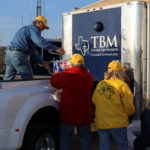During the last several days, many have expressed their sadness at the untimely death of Rachel Held Evans. In the midst of this outpouring of grief, I can’t help but turn to my pastoral side.
The Lord is my shepherd; I shall not want.
He maketh me to lie down in green pastures:
he leadeth me beside the still waters.
He restoreth my soul:
he leadeth me in the paths of righteousness for his name’s sake.
Yea, though I walk through the valley of the shadow of death …
(Psalm 23:1-4, KJV)
Grief is a walk. It may be a short walk. It may be a long walk. But it is a walk.
Grief is not a run or a campout.
Grief is not a race
Grief is not a race to the finish. Our culture constantly is racing to the finish. Our culture tells us we must be finished with grief as quickly as possible. Do your crying. Get busy. Get over it. But grief is not a race.
If we race through grief, we short cut important work God wants to do in us through grief. When we race through grief, we may skip the importance of denial, being properly angry, trying to cut a deal with God, being appropriately sad before accepting the loss.
If we shortcut or skip preludes to acceptance, can we reach full acceptance of something so profound as loss?
If we don’t allow ourselves to live through the phases of grief, then we push one or all of them under the surface, burying them under false smiles and brave façades, only to have them resurface later and usually in unhealthy and even harmful ways.
Racing through grief to get where we think we’re supposed to be—where we think others think we’re supposed to be—is like weaving recklessly through traffic or taking a curve too fast. You might reach your destination faster, or you might not reach it at all. You might get there safely, or you may damage yourself and others irreversibly.
Sign up for our weekly edition and get all our headlines in your inbox on Thursdays
Grief is not a race. Grief is a walk.
Grief is not a campout
Likewise, grief is not a campout. When loss happens—and it will happen—we do ourselves and others no good by sitting down somewhere and forgetting to get back up.
It does no good to hunker down in denial, anger, depression or bargaining. Each of these has its place, but only a place and not the sum total of existence.
But aren’t we entitled to anger, depression or trying to undo what’s been done? Don’t we have a right to be angry with God? Don’t we disrespect the deceased if our sadness is too short and too shallow?
If we make our dwelling place in depression and don’t move, then we neglect the important wrestling with God that happens in bargaining. It’s the wrestling that matters, and not the bargain itself.
If we make our dwelling place in denial and refuse to move, then we neglect the appropriate anger that should accompany loss, anger that God’s original design for this world is broken and we all suffer for it. It’s the agreeing with God that matters, and not the anger itself.
In our grief, we must keep going. We must keep walking, or the work of grief will never be done.
Grief is not a straight line
For some, grief is a long walk, and for others, it is a short walk. We each grieve in our own time. Therefore, we need to be patient with each other.
The length of the walk is not what matters. It is what happens to and in us along the way. God desires to teach us important things through grief.
Likewise, grief seems to skip steps, to jump around. Some seem to skip denial and maybe anger and go straight to depression and then bargaining. Others may go from denial to depression. If we skip steps, we may wonder if something is wrong with us. We may think we are not grieving correctly.
Then there are those times when, though we thought we were over it, bargaining circles back around: “Can’t I have just one more day?” After months—and maybe years—we wake up one morning not thinking about the loss, only to realize we are thinking, “What a bad dream!” And we wonder if we’ll ever be finished with grief.
We each grieve in our own way and in our own time. You may be angry, and my bargaining may infuriate you. And I may judge you for your anger as I wrestle with God. This will not do. We must be patient with each other.
Grief is agreeing with God
One of the reasons we must walk through grief and not race through it or camp out in it is because our grief is our agreeing with God that things are not as God intended. We can say few things more important than fully acknowledging the effects of sin.
When we walk through grief, we demonstrate our faith in God’s ongoing redemptive work in this broken world.
Another reason we must walk through grief is because engaging in the work of grief is insurance against creating unnecessary loss. We create unnecessary loss when we lash out at each other, pull away from one another or deny ourselves the healing that only comes when we walk through grief.
When we walk through grief, we open ourselves to the Spirit of God bearing good fruit in a world desperate to be rid of the bad.
And lest we think grief isn’t a walk, that our culture is right, that we just need to get over it, that we have every right to sit right down and die in our grief, we should remember the dark valley of death holds no fear for us because God is walking with us, even there.
Eric Black is the executive director, publisher and editor of the Baptist Standard. He can be reached at eric.black@baptiststandard.com or on Twitter at @EricBlackBSP.
















We seek to connect God’s story and God’s people around the world. To learn more about God’s story, click here.
Send comments and feedback to Eric Black, our editor. For comments to be published, please specify “letter to the editor.” Maximum length for publication is 300 words.